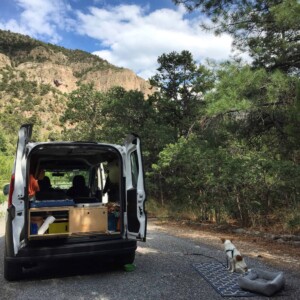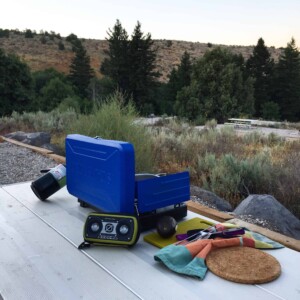(This is a guest post by our Wayfarer Ambassador, Shanna Trenholm. She posted a similar version on her site: averagewhitevan.com)
Traveling alone is exhilarating, but it can seem daunting if you’ve never tried it.
There’s the freedom and autonomy, and you have the option to change plans at a moment’s notice without consulting someone else. Plus, the sense of accomplishment when you overcome a challenge on your own makes solo travel fun and rewarding.
However, if you’re new to this, solo travel might not be your idea of a good time. Yes, there are many challenges to traveling alone, but even if going it on your own seems scary or boring, I hope that this post will encourage you to give it a try.
Here are a few of the pros of solo travel:
- You can do whatever you want. You can go where you want and change your mind to suit your interests. Because of this, you’ll learn more about yourself, what you like, and you’ll build resilience—especially when you’re in the no cell signal zone. Without the constant Wi-Fi connection you have when you’re at home, you’ll be on your own—and the results can be surprising.
With just your thoughts and desires guiding the way, where will you go? Your road atlas (get an actual atlas, not just map apps) will seem overwhelming when you aren’t sure where to go next, and the topo and road lines will start to blur together. But you’ll be okay. Being forced out of your comfort zone will strengthen your ability to be flexible and you’ll learn new skills, too.
 Shanna with her travel companion Milo
Shanna with her travel companion Milo
- Traveling alone builds confidence. Building on the first point, above, solo travel will give you a serious confidence boost. The day-to-day challenges of finding drinking water, fresh food, or a place to sleep for the night all count as mini-victories when you’re on the road (and especially when in tiny rural towns).
- You’ll meet more people. When you are traveling as a couple, people are reluctant to approach you. When you’re solo, people will see you as more accessible and they’ll be more inclined to chat with you. Whether traveling by van through Colorado or on foot through a small village in Europe, I always make new friends. When traveling with a friend or sweetie, not so much. There’s just something about being a duo—people aren’t as likely to approach you. Not to say that it never happens, but it’s less frequent when you are on your own.

- It’s easier to cook for one. This may not be the case for everyone, but when traveling in a tiny van, with a small cooler, having just enough to make a pot of soup or stew or whatever for one is a much simpler proposition. Of course, there’s always the chance of meeting a travel companion, for the long or short term, and this presents an excellent opportunity to make collaborative meals.
Some of the challenges you might encounter while traveling alone:
- You might get bored. Traveling alone, especially when driving long, dusty stretches of road can activate boredom like nothing else. It’s okay—being bored is not the end of the world. Plan for this by queuing up some books on tape and podcasts (like this one, or this one). The time you spend alone can be enlightening and enriching—you’ll be able to see problems in a new light and learn more about yourself (see #1, above).
- You’ll probably get lonely. Like boredom, loneliness is not fatal. Loneliness is just a sign of discomfort or the inability to be with one’s self. But if you endure it, you will get over it. Spend some time getting to know yourself and learning how to enjoy your own company—because, ultimately, you’re the only one you’ve got!
- Terrifying things might happen. It’s possible that something frightening might happen while you are out in the world. But, here’s a news flash: something awful can happen to you at home, too. Most of the scary things are statistically unlikely (Zombie Apocalypse, Jason finding you in the woods, etc.), but things like getting a flat tire while driving down a forest service can happen.
Be sure you have someone with whom you share your whereabouts. When I know I’ll be out of cell range, I’ll text a friend and drop a pin or give them the campground/area name and number of days I plan to stay. Before you hit the road, you can prepare for flat tires and other automotive situations. Know how to change a tire, have your vehicle serviced, and sign up for AAA or similar roadside assistance (don’t expect them to follow you down that forest service road, though—especially if you are out of cell range and can’t make a call).
Don’t let the fear of what might happen stop you from traveling—the benefits and joys far outweigh the possible or imagined things that could go wrong. Oh, and a final note—something, several things, will go wrong, but most things are not Jason-level scary. It will be okay.
I think one of the best ways to travel is in my Wayfarer van, obviously 🙂 I feel safe inside, and I can drive away at a moment’s notice.
If you have ideas, questions about traveling alone, or want to share your solo travels joys with me, drop me a line at hello (at) averagewhitevan (dot) com.
 Shanna with her travel companion Milo
Shanna with her travel companion Milo